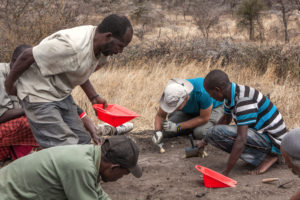
Preliminary digging and cleaning operations at Laetoli Site S. Photo Sofia Menconero http://www.paleoantropologia.it
Additional footprints belonging to a group of early humans have been uncovered in Laetoli, Tanzania, dating from 3.6 million years ago. The prints were made when five of our ancient ancestors walked across wet volcanic ash.
The 13 footprints were discovered by an international group of researchers, led by Sapienza University in Rome. The researchers believe that they belong to five members of Australopithecus afarensis – the pre-human species best known for the fossil skeleton, nicknamed ‘Lucy.’ Professor Giorgio Manzi, lead author of the study, said: “This novel evidence, taken as a whole with the previous findings, portrays several early hominins moving as a group through the landscape following a volcanic eruption and subsequent rainfall.”
“The footprints of one of the new individuals are astonishingly larger than anyone else’s in the group, suggesting that he was a large male member of the species,” he added.
Based on measurements of the length and width of the footprints, stride length and the angle of the gait, the male weighed around 48kg (100lbs) and measured about 5 foot 5 (165cm), while the lightest of the group only weighed 28.5kg.
Researchers say the footprints suggest that members of Australopithecus afarensis may have had a social arrangement of one dominant male mating with several females.
